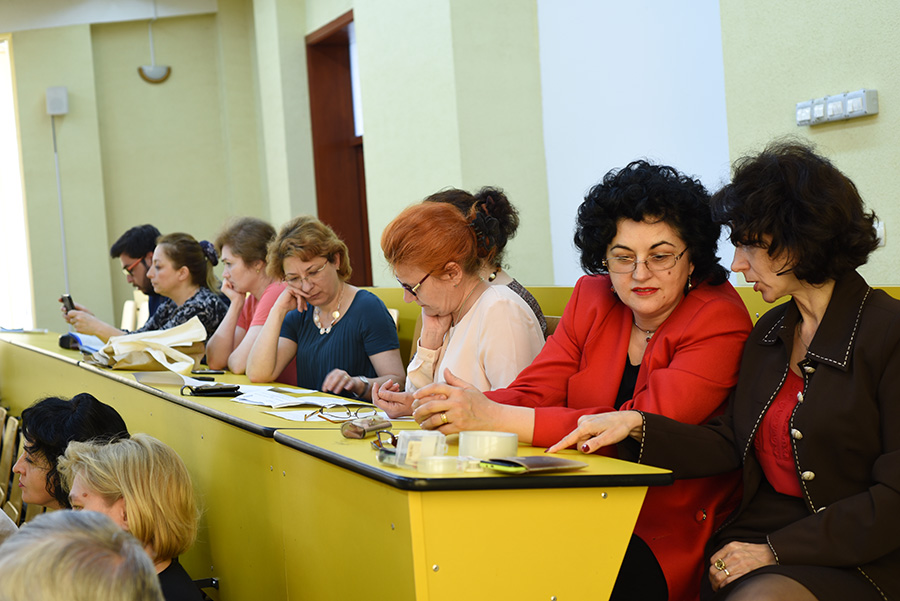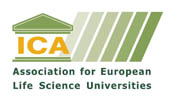"TRENDS IN FOOD SAFETY AND FOOD SECURITY"
Chair: Prof. Dr. Teodor TRASCA
Banat’s University of Agricultural Sciences and Veterinary Medicine "King Michael I of Romania"
Co-chair: Prof. Dr. hab. Ewa REMBIAŁKOWSKA
Warsaw University of Life Sciences (WULS), Poland
The session "Trends in food safety and security" consisted of two parts: IIa on Monday, May 23th, 2016 and IIb on Tuesday, May 24th, 2016, both held in the Amphitheater "Ionel Jianu", in the Building of the Faculty of Food Processing (yellow building).
According to the program of the conference there were 9 oral presentations and 15 poster presentations in this session. All presentations were very interesting and gave us the opportunity to analyze many issues related to food safety and food security. It was a very enriching experience for all involved in this session- for both speakers and participants.
Briefly, I will describe below the different aspects discussed in this session of the conference.
Many teachers, PhD students and students from Banat’s University of Agricultural Sciences and Veterinary Medicine ‘’King Michael I of Romania’’ from Timisoara, especially from the Food Processing Faculty attended the sessions. Moreover, on both days of the sessions the students involved in the CASEE-In-Project (from University of Zagreb, Szent Istvan University of Gödöllö/Hungary, Banat’s University of Agricultural Sciences and Veterinary Medicine “King Michael 1st” of Timisoara, State Agrarian University of Moldova in Chisinau and from University of Natural Resources and Life Sciences, Vienna) were present.
Topics addressed in the oral Session:
1. Carcass quality in relation to the lung lesions in pigs.
2. Effect of processing methods on the bioactivity of parsley.
3. Importance of the grape phenols in the human diet.
4. Free and encapsulated probiotic, cells viability.
5. Process design and polyphenols in beer.
6. The essential oil bioactive metabolites of cumin as antimicrobial agents on the quality of cheese.
7. The steps involved in development of a new beer type in a brewery pilot plant.
8. Sarcocystis spp. in pigs and cattle – epidemiology of meat borne pathogens.
9. Quality and safety of the traditional Romanian meat products.
The level of all presentations was very good or good. The participants discussed about the above mentioned topics and answered the questions. All presenters were able to show their knowledge and involvement on the topic of food safety and food security.
The Chair of the poster session was Prof. Dr. hab. Ewa REMBIAŁKOWSKA from Warsaw University of Life Sciences (WULS), Poland. Prof. Dr. Teodor TRASCA from Banat’s University of Agricultural Sciences and Veterinary Medicine ‘’King Michael I of Romania’’ from Timisoara, Romania was a Co-chair.
There were only 13 poster presentations in this session; 2 posters were not presented. The authors were presenting their results to the audience, whereby every poster was 3 minutes.
The predominant topic was the role of different antioxidants, mostly phenolic compounds in the production of new functional products, for example balsamic vinegar with black currant juice. Several posters concerned new analytical methods, for example thin layer chromatography (TLC) separation combined with Raman mapping.
Impact of the valuable food on human health was also presented – impact of honey consumption on tennis players and inhibition of cell proliferation by anthocyanins from selected fruits.
Exploitation of food wastes as valuable sources of bioactive compounds and novel foods were also presented as posters. One poster was related to the organic products (beetroot juices).
To summarize, the level of both oral and poster sessions was very good, indicating deep involvement of young researchers into the innovative and basic problems of food quality and safety in a context of human health. It creates a good opportunity for the future of food science in Central and South Eastern Europe.
Presentations:



